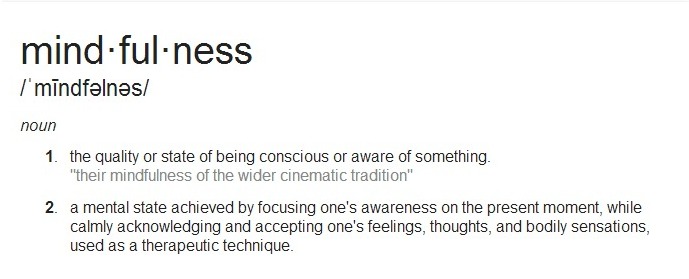
Today I want to talk about mindfulness. I was fortunate enough to attend a wonderful event a few nights ago during which one of the keynote speakers discussed mindfulness, what it means, and why it’s important for us in today’s world.
So, that got me thinking and I looked up the definition of mindfulness and this is what I found:

I’d like to delve deeper into the second definition – “a mental state achieved by focusing one’s awareness on the present moment, while calmly acknowledging and accepting one’s feelings, thoughts, and bodily sensations, used as a therapeutic technique.”
I feel like there is a sort of stigma around mindfulness that makes a large number of people think that only super centered yogis, saints or peaceful gurus can successfully be mindful and that the whole concept of mindfulness is great, but in our everyday lives, surely meditation and mindfulness can’t do all that much, can it?
Well, I’d like to talk about how the two are related and how mindfulness is less of a lofty destination and more of a process of training our minds to select our thoughts and be truly present in the current moment.
This mindful mental state helps us to be more focused, aware, calm, active, awake, happy, loving, attentive, and so on. Through a mindful way of viewing the world, we are able to be fully mentally present in each moment. This allows our brain to function at its optimum level and perform the way we need it to in a variety of situations.
Mindfulness is a lot like anything else in that it takes constant practice and dedication. While we, as human beings are incredibly intelligent, we are still animals and have natural instincts. A large part of what makes humans so incredible is our intellect and our ability to rise above what our knee-jerk reaction is to our ever-changing circumstances. While intuition and instinct can be a benefit to us if we know how and when to trust it, if we simply blindly follow our instincts, it can actually be detrimental.
Life is never going to give us a playbook and tell us what’s coming next and so we either go through life muddling through the twists and turns of life reacting to our surroundings, or we embrace our circumstances and choose to fully embrace each moment for exactly what it is and choose how we react and respond.
One tool we can use on our mindful journey is meditation. Again, I feel like there are some uncomfortable feelings about the word “meditation”. However, meditation is really just thinking deeply or focusing one’s mind for a period of time. This can be done in silence, through chanting, with music, for religious or spiritual purposes or simply as a method of relaxation. Meditating doesn’t have to mean that you are having a mystical or spiritual experience at all. It can simply be a way we practice being mindful through a specific time designated to deep intentional thinking.
Though meditation has been shown to be a wonderful tool to practice mindfulness, it isn’t the end-all, be-all method. Mindfulness can be practiced through gardening, prayer, writing, drawing/coloring, etc. It is entirely about what works for each person and helps them to be aware of the world around them and practice being present. Mindfulness requires willpower. It requires us to select our thoughts the way we select our clothes every day rather than just reacting to the world around us. This is a power we can cultivate, but we have to be dedicated to it and not expect it to come the first time we try it.
I’m not saying people who practice mindfulness never have other things on their minds than what is exactly in front of them, but they have found a way to be intentional about their thoughts and really understand what is going on in the present moment. They have found ways to still their minds so that they are able to slow down the hectic pace of the day or their job and simply handle things as they come. And this allows them to be powerful.
This power is important for all people, but especially for those of us who have stressful jobs or demanding workloads in school or even young children. The pace that life takes in any of these examples can be hectic at best and a stressful nightmare at worst. However, if we take time, even ten minutes per day, to practice mindfulness through meditation or simply by noticing and appreciating small things around us that help keep us in the moment such as our breathing, our thoughts, and how we respond to certain things, we are better equipped to handle the present moment and our lives.